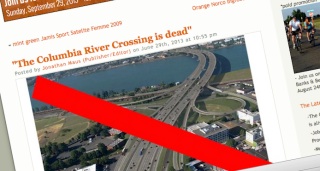
It may be a hot Friday afternoon in the middle of August, but the president of the Oregon Senate has spent it making calls to key legislators, counting votes for a possible resurrection of the Columbia River Crossing.
That’s the latest word from Sen. Rod Monroe (D-East Portland), a longtime backer of the CRC who said a one-day special session that would include a new deal on the big highway-rail project is possible, but not likely.
“I would say right now the chances of a special session are at best 50-50, maybe not even that high,” said Monroe, a former Metro councilor who sits on the Business and Transportation Committee and the special committee regarding the CRC.

Peter Courtney.
Monroe, reached by phone at his home office, said he’d spoken with Senate President Peter Courtney (D-Salem) less than an hour before. “He absolutely does not want to have a special session that would last more than one day without everything agreed to in advance and the votes there,” Monroe said of Courtney.
The CRC would not be the only subject of such a special session, Monroe said — public pension reform and tax increases would be on the table. Monroe said he saw almost no chance that the CRC in itself would be enough to motivate a special session.
Given this situation, it’s possible that a CRC revival, which would be popular with some businesses and labor unions, is being used as a bargaining chip in the effort to assemble the votes for a tax deal.
Last year, Oregon’s legislature used a one-day special session to sign off on a similarly pre-arraged tax lock-in designed specifically for Nike.
As the Willamette Week, Oregonian and Columbian reported two weeks back, the deal to resurrect a project that was declared dead would require rewriting the compromise Oregon legislators resoundingly approved last spring: That Oregon would only borrow $450 million against as-yet-unidentified future revenues if the state of Washington agreed to pay the same.
This summer, Washington’s state Senate narrowly killed that deal, which means that Oregon backers of the Columbia River Crossing are looking for a do-over. Monroe said that with the cooperation of Vancouver’s mayor and Washington’s governor, both of whom publicly back the project, Oregon could put tolls on the bridge itself and send the light rail line across without Washingtonian support. Washington could then choose whether or not to complete the planned highway expansions on its side of the river on its own time.
This workaround would also put Oregonians on the hook for all of any cost overruns.

(D-East Portland)
Monroe said Oregon’s one-day session would have to happen before Oct. 1, when Oregon’s current funding commitment expires.
It remains to be seen whether the federal government would actually put in its $850 million share of a project that was, for more than a decade, pitched as a bi-state solution. Bridge opponent Joe Cortright argued earlier this month that without the Washington-side highway expansions, the project “would differ so substantially from the original proposal that it probably wouldn’t qualify for federal funds,” as the Oregonian reported.
For his part, Monroe said he supports a new highway bridge as long as it also includes a bicycle-pedestrian path, light rail to Vancouver, and tolls of perhaps $2 to $3 per car for people crossing the bridge.
Those three factors are “an absolute quid pro quo,” Monroe said. “I don’t support the project without it. … And if I don’t support the project, I think I could control enough Democratic votes that we could stop it.”
It’ll be interesting to see how other Democrats, especially Portlanders whose votes for the CRC plan were more reluctant than Monroe’s, will be handling this unusual situation. You can let them know your own feelings here.



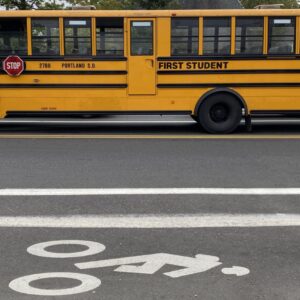
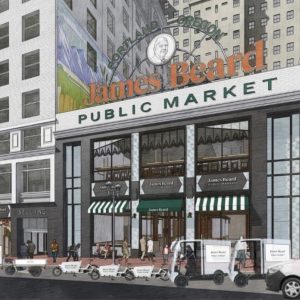
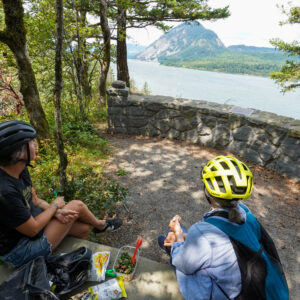
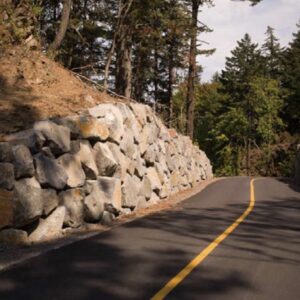
Thanks for reading.
BikePortland has served this community with independent community journalism since 2005. We rely on subscriptions from readers like you to survive. Your financial support is vital in keeping this valuable resource alive and well.
Please subscribe today to strengthen and expand our work.
It’s sad to hear that this gift to Vancouver commuters has still not been put to rest. It’s even sadder to think that we Oregonians will be paying for their bridge. I hope the C.R.C. is killed once and for all.
“Monroe said he supports a new highway bridge as long as it also includes a bicycle-pedestrian path, light rail to Vancouver, and tolls of perhaps $2 to $3 per car for people crossing the bridge.”
Is the logic here that even though Washington legislators made it clear that the above package isn’t something they want we can go ahead and build it without them? How is that supposed to work?
Oregon had to commit to borrowing hundreds of millions from our children and grandchildren to build it on the assumption that WA was in; now that they are out I’m missing something.
Remember when the Oregon Dems said the triggers were binding? Guess not so much anymore. Time to vote these liars out.
I contacted my state representative when the CRC started showing signs of life again and let him know that I still oppose it, even more so with less Washington contribution. I guess I’ll also be contacting my state senator…
http://www.leg.state.or.us/findlegsltr/
I guess the “victory dances” may have been a little bit premature after all. This thing may be delayed for a time, but it is far from dead. If, in 10 years it finally comes to fruition it will likely be at 10 times the current cost. What kind of victory will that be? Keep dancing!
“If, in 10 years it finally comes to fruition it will likely be at 10 times the current cost.”
Unlikely.
(1) History/climate change/VMT decline will overtake this before then;
(2) Money we don’t have now ($4B) won’t multiply 2, 3, much less 10-fold;
Construction costs will multiply simply as a factor of material costs rising.
A simple search will show that long term steel prices will continue to rise. Concrete and all heavy materials require energy intensive transport the cost of which energy (as fuel or electricity) will continue to rise.
Concrete creation especially is extremely carbon intensive and any fair carbon tax will drive up the cost of concrete. As essential as concrete is to so many projects if I had to predict that only one exemption to a carbon tax would be handed out it would be to the concrete industry.
Most importantly to our interests every delay changes the planning parameters making previous plans obsolete. Granted, WE can see that the new CRC would be unneeded and over-built but even the “Build Baby Build” crowd will admit that if enough growth occurs between the CRC plans being initially drawn up and theoretical construction starting that the planning stage would need to be reaccomplished to factor in new growth patterns.
Perhaps drawing this Zombie-CRC resurrection process out has some strategic advantage. It was “killed” the first time over money, it will be killed the second time the same way.
Point out the uncertainty of federal funding, material costs, state revenue, predicted VMT for projected toll revenues, planning needing to be done again. Stop trying to convince people that it is bad for the community or the environment. Show them how it might maybe possibly be bad for their wallet and it will die for good.
You underestimate how willing your representatives are to spend money that they do not have!
Then the trick is to get a professional advertising company to do some TV spots and banner ads that use the right wingers favorite trope, FUD (fear, uncertainty and doubt) against them.
Detroit, Michigan just filed for bankruptcy.
The whole city.
Needless to say they won’t be issuing anything other than municipal junk bonds for a few years.
We may not be able to precisely predict the future but the same can be said of the CRC proponents.
In the Ominous Movie Preview voice:
In a time of fiscal uncertainty…
In land where the federal government has no choice but to abandon all but the largest urban areas…
When we can scarcely afford to maintain the roads we have…
Comes a highway building project so big that you can’t see the bridge for the forest of overpasses slated to be built.
The dark forces of corporate greed are feeding off the life blood of our state…
Their corrupting influence over OUR elected representatives forcing them to ignore all signs that the project will bankrupt our city and state coffers for the tenuous promise that temporary jobs will be created.
Visuals of crumbling infrastructure, schools being closed, rampant gang/riot crime, opulent construction company owners.
It may be time to play dirty; remember, the is no Geneva Conventions for political ads.
Now’s the BTA/OLCV etc. final chance to actually do something.
Is this work your doing OUR tax dollars at work Mr. Monroe, or someone else’s dollars?
It was obvious when it was declared dead it would return in various forms. There is too much money involved, and politicians love money because we have created a horrible system where they are unable to reach power or stay in power without it.
Perhaps some Oregon representative(s) can add language to this legislation to directly tie the local funding for the highway portion of this project to the annual income taxes paid for by Washington residents working in Oregon. That might make it more successful and less painful for many on both sides of the river.
…looks like BikePortland scooped the majors on this topic (special session for the CRC) today.
Good lord, give up already. At least Monroe requires the rail/bike path/toll, you have to give him that.
http://www.leg.state.or.us/findlegsltr/
Speak up or they’ll assume you have no opinion.
They already ignored us the first time, but I agree it’s time to put their jobs at risk.
Thanks Michael for a great quote. It shows that our elected officials do not represent people in their districts. Our “reps” follow the leadership of the House Leader( Rep. Tina Kotek ) and Senate Leader. (Monroe)
Tina told me, Jim Howell and Joe Cortright in a CRC meeting and I quote “It does not matter, because you are in a minority”
And here is Monroe’s quote:
“I don’t support the project without it. … And if I don’t support the project, I think I could control enough Democratic votes that we could stop it.”
Power hungry leaders….their way or the highway…..The project has never been about picking the best design or answering questions. I think Kris Strickler, Tina Kotek and Rex Burkholder will wind up funding this on their own if Salem and Olympia cut funding.
“I think I could control enough Democratic votes that we could stop it.” — Rod Monroe
That’s hilarious. Rod Monroe is a kingmaker in his own mind. And nowhere else. He controls exactly one vote. And sometimes, we’re not sure that’s true either.
I am shocked that not more people are up in arms about this new “plan”. The mere notion that a few private business leaders signed an open letter is all it took to urge serious contemplation of this crazy scheme (after a decade of planning) is outrageous.
And I see the O has already fallen in line and endorsed the deal. Wow, things seem to move pretty quickly when you have the ear of your local rep and the $$ to match.
Follow the money.
& http://www.oregon.gov/gov/Pages/ShareYourOpinion.aspx
This is the worst possible deal for Oregon. We raise the money, we assume all of the risk. For what benefit?
Any legislator that backs this needs to be voted out next round. We will make a list.
We get all the toll money. Plus, administration by one state and not two is more efficient.
The toll revenue projections are so off-base, it isn’t funny. And it’s especially unfunny if your state is on the hook for cost-overruns as well…
http://www.oregonlive.com/business/index.ssf/2013/03/columbia_river_crossing_consul.html
The assumed massive increase in traffic will not materialize, due to continuing decline in VMT per capita and diversion to I-205. If you think this is a good idea, you must not be an Oregon taxpayer…
Please go read this article and justify why you are more correct about your suppositions on tolls being a reliable revenue stream when national credit bureaus (whose business involves not losing a financial gamble) say tolling is not a reliable nor long-term revenue source.
I would like to believe that tolling is a good business model but above and beyond the main instance cited in the Streetsblog article I can point to some current toll highways I’ve used, as a trucker this year, where the toll-free highway is 50%-100% longer than the tolled option, clogged with 20MPH traffic regularly and yet $6 ($1.50 for cars) fee for a big truck is saved on fuel alone.
If the CRC is built AND tolled all truck traffic will divert to the 205 as will any car driver that can internally justify being cheap or thinks the “Gubmint’s out to git me!”
Counting votes… but for what, exactly?
A bill that removes one or all of the ‘triggers’ that were supposedly put their for our (financial, etc) protection?
Plan B: put Oregonians 100% on the hook for this project for any cost overruns and that tolls revenue shortfalls.
Here is a recent streetsblog article about how credit agencies no longer see tolls as the good bet: http://dc.streetsblog.org/2013/08/05/credit-rating-agencies-uneasy-about-toll-roads-as-americans-drive-less/
This is a high risk bet for Oregonians with very little, if any, return on investment. It’s a great deal for bond buyers and bridge builders, though, they get paid no matter what.
Instead of trying to resurrect this counter-productive project, Oregon legislators should let this thing die and breathe a sigh of relief that we all got let off the hook. Representatives who have the best interests of Oregonians in mind will do just that.
Somewhere there must be a list of urban toll bridges where the revenue collected equaled or exceed revenue forecasts. If that list comprises anything less than 25% of all urban toll bridges it looks like a bad financial bet.
But how many of those bridges have a non-tolled version sitting 5 miles away?
Project all you want but the minute a toll goes on the I-5 bridge the 205 bridge becomes the entry point of choice into Oregon.
That’s my point.
Common sense tells us that tolled roads and bridges are a government racket that brings in untold fortunes.
There is NO EVIDENCE to back that up but the assumption holds political water.
And this is an important angle to consider. The bond market does not care about politics, it only cares about risk and math. Given the increasing problem of municipal debt default in this country – and it’s only a matter of time before some state defaults, it may not be as great of a deal for bond buyers as it might have been in the past. Oregon really does not want to be in a situation where their bonds are worthless or even of less value. I am uneasy about government debt in general principle, but we really don’t want our state bonds to be undesirable in the bond market should we need to use them to finance some major catastrophe (heaven forbid). Bond buyers don’t do what they to to be nice. Politicians tend to ignore the math in favor of political decisions that make their voter base feel good. This is a very bad idea when you consider that the fundamental rules of math don’t change in accordance of how people feel about something. Math = the honey badger.
It’s time for a solution that reasonably accomodates all interests. Bikes are great, but I really don’t see that many people using them in the winter, and I live right on the Springwater Trail. The surge ins use there is indicative of the recreational interest, not the commercial utility. We need transportation planning that works in any season and for all modes. A shortcut (see my Oregon Catalyst article) benefits all modes: http://oregoncatalyst.com/24175-alternative-crc-bridge.html
“We need transportation planning that works in any season and for all modes.”
Your article does not take account of the dim prospects for VMT growth in the future, the decline of automobility, the fact that infrastructure built today should make sense ten or twenty or even fifty years from now, and in a few short decades private cars driven everywhere, all the time, by the majority will be history.
It may be true that bike riding declines with temperatures and the rainy season, today, but that doesn’t preclude donkeys or rickshaws or bike trailers clogging up our active transportation infrastructure tomorrow, and spilling onto the streets and roads we think of as reserved for the automobile.
The Springwater is a predominantly recreational use path! How is that indicative of bike ridership in the winter months for transportation? Come down to the Hawthorne bridge during Jan. We’ve got a bike counter now. You’ll see that the counter only usually drops to about 50% of most summer days. Yes, that’s a drop, but hardly supports the idea that bike are poor year round transportation.
Not sure why this is such a surprise. The crossing is still woefully inadequate, and it’s getting older every day.
“it’s getting older every day”
that is true for most of us.
Yeah, but if I fall into the river, few will miss me.
No respect I tell ya’, no respect.
What is to be done? I-5 from the marquam to the Columbia is messed up.
Why would vancouver not want light rail? How about a light rail / ped/bike only bridge ( and a parking garage in vancouver)?
The impression I get out of Vancouver’s rhetoric is that public transportation of any sort is a communist incursion in their last bastion of pure American values.
I thought it was mostly just that it would bring Portland crime to Vancouver, which apparently has no crime problems? Who knew?
A couple more pragmatic reasons for the opposition to light rail are that bus rapid transit is cheaper and more cost-effective, and that Vancouver and Clark County didn’t want to be bound to TriMet financials. The slow speed/frequent stops of the yellow line MAX also works against it.
Yes, but bus rapid transit requires an entire auto lane of dedicated space. Do you honestly see that happening?
LRT requires even more space than BRT. Something would need to change (gas prices? local politics? fed monies?) before I’d wager anything on either one going forward in Vancouver.
Don’t get me wrong, I’m not against LRT per se, especially for interurban runs, I’m just responding to Jake’s question with some objections which do/did have some sway in Vancouver with regard to the CRC. I do think that BRT or trackless trolley is a better option than streetcars, though.
I’m Agreeing with Alan 1.0.. It’s more complicated than what you are making out. In Vancouver itself, in the city limits, almost every C-Tran and transit vote passes with 60% or better and even in Clark County as a whole they almost always pass 51% unless light rail is involved.
I personally nearly always support transit, but am very ambivalent about MAX. It is too slow for long commuter trips from Vancouver. There is only one track and no express trains and no way to accommodate that. Tri-Met isn’t in great shape managerially or financially. It’s expensive and doesn’t help the people in Vancouver that need transit in Vancouver.
Overall, I’d take it. I wouldn’t vote against it straight up on it’s own (without a stupid bridge, 3 parking garages and 4 interchanges). But I don’t see it as a great solution and I’d be a lot more enthusiastic about a better solution.
Well I wrote my state representatives. Being a newly minted resident of House District 7 My state Representative is a Republican. His aid sent me a very nice email saying that Rep Hannahs’ concernes mirrored my own. This made me realize that we need a GOP/Progressive coalition to stop this thing. If the GOP is against it, and enough Portland Progressives bolt the party line….
Oregon conservatives and liberals hand in hand fighting to stop the $4.3 billion boondoggle that is only being lobbied for by the construction firms that stand to gain.
Stop government waste!
Stop government corruption!
Stop pork barrel projects that serve mainly to line the wallets of those companies that would own our elected representatives!
Stop the CRC!
We should hold Senator Lee Beyer to his word. Check out this quote from April: http://seattletimes.com/html/localnews/2020845340_oregonbridgexml.html
—–
Sen. Lee Beyer, chairman of the Senate Business and Transportation Committee, agreed the bridge project would die if Washington opposed light rail or did not come up with its share of the money for the project this year.
“Any change to the project kills the project,” said Beyer, a Democrat from Springfield. “There isn’t the political energy to go forward and fight the battle again. We have other things we have to worry about.”
—-
Indeed we do!
People like Chris Dudley and Mayot Charlie Hales take up residence in Washington to save on overall Oregon taxes. Now Politicians think Oregonians building and paying for a bridge to help facilitate tax dodgers is a good investment? You must be kidding me!